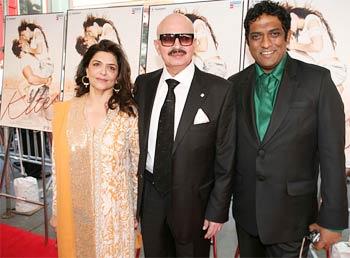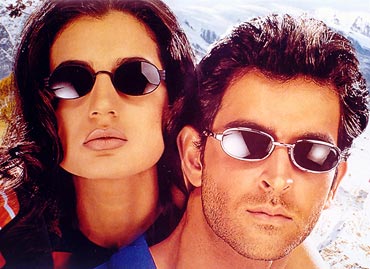 During the first day of the shooting of the movie Kites, the writer and director Anurag Basu explained a scene to Barbara Mori , the Mexican TV and movie star. She listened to him for a few minutes, and then politely requested him to repeat it in English.
During the first day of the shooting of the movie Kites, the writer and director Anurag Basu explained a scene to Barbara Mori , the Mexican TV and movie star. She listened to him for a few minutes, and then politely requested him to repeat it in English.
"Guess what? I was speaking to her in English all the time," the self-effacing Basu says, laughing loudly and his hands flying wildly. "I knew then she was not getting my English,."
So he practiced using his hands to drive a point or two.
His wife has been asking him for months why he is making so many gestures, he continues as he chats with a few journalists at a press conference for the film in New York. "She thinks I am into sign language."
Basu was apparently having no trouble with his English when he went buying street food in New York which he was visiting for the first time. The hotel suite he has been staying in New York would easily cost $350 but for about $8 he has been enjoying delightful street food at almost every meal.
"I wonder if there is any city where you get street food from so many countries," he muses as he chats with a reporter after the round table conference. He is amazed at the variety: Arab chicken, Turkish kebabs, the freshest falafel sold by Israeli and Palestinian vendors, biryanis, and empanadas inspired by Argentinean cuisine.
"There are many times I long for simple but tasty food," he adds. Like in his films, he says he wants to see a core of honesty in any preparation.
The honesty factor was very important to him he says as he segued from Life in Metro into Kites. The former hardly cost $1 million while the latter has reportedly cost about $15 million.
"I told myself that I should not be carried away by the opulence," he says. "Just because I had a lot of money at my disposal did not mean that I was going to blow it up."
His films including Gangster have characters that are complex. There are shades of white, black and grey in them.
He assures that Kites is not just a big budget escapist film. It has its own complexities, he asserts.
The project started with producer Rakesh Roshan asking Basu, after seeing the latter's Gangster, if he has any project for his son Hritik Roshan.
As he was chatting with Roshan, Basu asked him what films he was working on. Roshan had begun working on the script for Kites. It suddenly struck Roshan that Basu could direct the film.
But Basu said he could not take up the offer. For he was used to making low budget films. Rakesh Roshan who had given him a 15 minutes narration about Kites asked Basu not to close his mind. Could he come and see Roshan after a few days?
Over a week passed, there was no sign of Basu, Roshan recollects. He thought the film maker had got fold feet. Nearly a month later, he turned up, though. He began the narration; he was telling the same story Roshan had told him but he was taking more time.
"In fact, he took 45 minutes," Roshan says chuckling. "He had worked on what I had told him, added plotlines and plot twists to it. He had created his own story and screenplay."
Roshan felt very assured that his project was in right hands.
Shooting the film in New Mexico, Arizona and India called for intricate and thorough planning.
Basu says language problem with Mori was not just the problem he had with his stars. Hrithik had injured his knee before the shooting started.
Yet he insisted on doing many of the difficult stunts by himself, Basu says. After every scene was shot, Basu would ask about the knee. Hrithik must have thought Basu was the kindest director on earth. "But little did he know I would not remember, after the shooting was over anything about his knee,' Basu says with a hearty chuckle.
Even before the shooting was completed, Roshans and Basu felt that the film had the potential of reaching a wider and non-South Asian audience. The idea of an international and shorter edition started taking shape.
Basu confesses initially he did not react favourably when he heard that Brett Ratner, one of Hollywood's best-known producers and directors, had been requested to prepare the international version.
"I could not believe how anyone could cut a minute from my film but he cut 30 minutes and he did a great job," Basu adds.
What does Basu think of his own version?
"My previous films including Murder looked better on paper," he asserts. "In the case of Kites the film looks better than what was on the paper."
Within minutes of the press conference, Basu walked out of the Four Season's hotel and wandered into Borders bookstore.
He hardly leaves a town or city without visiting a bookstore, he confesses but he also admits he finds big bookshops too neat. "I like the old fashioned bookshops,' he adds.
A journalist tells him of a big bookshop in New York which boasts of its 8-mile long books. And yet it has an old fashioned look and a bit of musty smell. Basu had of course heard of Strand, he says. He was expecting a cousin from Boston to visit him that evening. "I would like to spend couple of hours there,' he continues.
Are there any good street food stands around the Strand, he wants to know.
 Actor Amitabh Bachchan, who has been shooting an ad-film in Kutch for the past three days, began his day on Sunday by shooting in Prag Mahal, an old palace located in the heart of Bhuj city.
Actor Amitabh Bachchan, who has been shooting an ad-film in Kutch for the past three days, began his day on Sunday by shooting in Prag Mahal, an old palace located in the heart of Bhuj city.


 The verdict is out. Rakesh Roshan's latest venture Kites may not be getting a 5-star review, but the actor-turned- filmmaker is confident that it will become a trendsetter in Bollywood. He speaks to Sreya Basu during a post-release promotional visit to Kolkata.
The verdict is out. Rakesh Roshan's latest venture Kites may not be getting a 5-star review, but the actor-turned- filmmaker is confident that it will become a trendsetter in Bollywood. He speaks to Sreya Basu during a post-release promotional visit to Kolkata. Every filmmaker says his film is 'different'…
Every filmmaker says his film is 'different'… Kites is a project that was made aiming at global audience. But Barbara's presence in the film is purely out of the script's demand.
Kites is a project that was made aiming at global audience. But Barbara's presence in the film is purely out of the script's demand.




 During the first day of the shooting of the movie Kites, the writer and director Anurag Basu explained a scene to Barbara Mori , the Mexican TV and movie star. She listened to him for a few minutes, and then politely requested him to repeat it in English.
During the first day of the shooting of the movie Kites, the writer and director Anurag Basu explained a scene to Barbara Mori , the Mexican TV and movie star. She listened to him for a few minutes, and then politely requested him to repeat it in English. For the last six months, Hrithik Roshan, who has been shooting for Sanjay Leela Bhansali’s Guzaarish, has been viewing the world through the eyes of a dead man. And the experience has changed him too.
For the last six months, Hrithik Roshan, who has been shooting for Sanjay Leela Bhansali’s Guzaarish, has been viewing the world through the eyes of a dead man. And the experience has changed him too.

